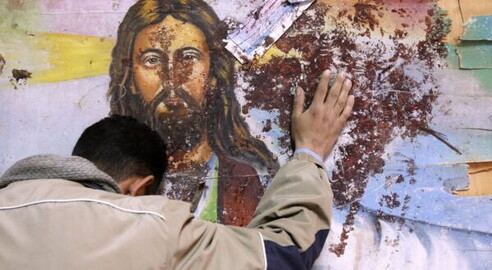
It is high time for a fight without borders, the Italian head of state writes to IL FOGLIO newspaper
Slaughtering Christians. How to react to a modern tragedy
This is a tragic time for Europe and the world alike. A barbaric and inhumane fanaticism has struck Paris, the heart of our continent and culture. Fundamentalist terrorism is a threat to the values of freedom, democracy, solidarity and civil coexistence. Insane and lucid at the same time, the strategy of extremism is clear: trying to plant within our society feelings such as fear, disaggregation, hatred and the temptation to close up. After the slaughter of young people in Paris, public opinion has been brutally faced with thedramatic and crucial issue of extremist violence, whose aim is to erase our culture, history and values.
The problem is actually much more rooted in the past. It concerns the respect of the international community of universal human rights, overshadowed and violated in many parts of the world. Religious persecution never stands alone, but is rather part of the cruel and systematic violation of fundamental freedoms, of which a crucial element is the right to profess, preach and even change one’s religion, withoutdiscrimination or reprisal.
The Paris massacre is the direct result of preaching hatred against “those who are different”, and of the persecution experienced by religious minorities, especially Christians, around the world - it would be unreasonable to deny that.
Certainly, in their different manifestations, Christians are not the only ones suffering from oppression and tyranny, so too do many other religious, cultural and ethnic groups. They are victims of prejudice, hostility, discrimination and violence at the hand of terrorist groups, aggressive majorities or totalitarian states and laws.
However, the Islamic radicalism and fundamentalism that have recently exploded, and stemming from within large regions of Africa and the Middle East, have tragically expanded the dimension of this truly global emergency. Among all of them, the numerical data about Christian communities really stand out, as they are, in absolute terms, the most persecuted community, with the highest number of victims. Ancient and rooted flourishing communities, accustomed to dialogue and peace, were completely eradicated from different areas in the world, or reduced to small groups, threatened and oppressed. The Christians in any and all latitudes that were decapitated, crucified and burned alive, are calling upon everyone’s conscience. Pope Francis has launched his painful outcry, speaking of a much larger and serious martyrdom than that of the first years of Christianity. This statement cannot leave us indifferent.
After years of turning a blind eye and keeping silent, the international community is finally starting to understand the seriousness of this phenomenon. It is a threat, not only to the religious freedom of individuals, but as the two Paris attacks teach us, also to democracy and peaceful co-existence acrossthe entire international community. Religious peace, tolerance and collaboration between different faiths are, conversely, a crucial factor for wellbeing, social equilibrium and economic development.
I recently returned from a trip to the East, during which I also traveled to Indonesia. This country is now experiencing great economic and political growth. Since its foundation, the country has had a constitution that grants equality, respect and freedom to all religions. Indonesia numbers 205 million Muslims and it is the biggest country in the world with a Muslim majority. The country is a model that should be better known and promoted. Here, religious representatives not only cooperate with each other, contributing to the country’s cultural, social and economic development, but they are animated by sentiments of true and brotherly friendship. The leaders of the Muslim communities who I have met were very keen on highlighting the liberal and moderate nature of Indonesian Islam, and they strongly condemned extremism and religious violence. Considering every person as God’s child is the common root that brings equal rights and dignity to all.
[**Video_box_2**]These universal principles are the only ones that can guide the international community towards a future of peace, development and wellbeing. Therefore, we must strongly reject the challenge of fundamentalist terrorism, which often hides its quest for domination and subjugation under religious pretenses. Lowering ourselves to their level, that of a clash of civilizations or religions, would be a serious mistake, whose consequences are hard to fathom. The challenge of fundamentalist terrorism is today’s most serious threat to world peace, and probably for the coming years as well. It will be a demanding and complex fight, which has to be carried out everywhere, across all borders, not only implementing the necessary military actions and increased security measures, which every citizen is entitled to, but also using the weapons of culture, dialogue, and the rule of law. We must deploy the same level of intelligence and hindsight as well as the necessary rigidity. In our recent past, many errors of judgment were made. Now, there is no longerroom for error.









